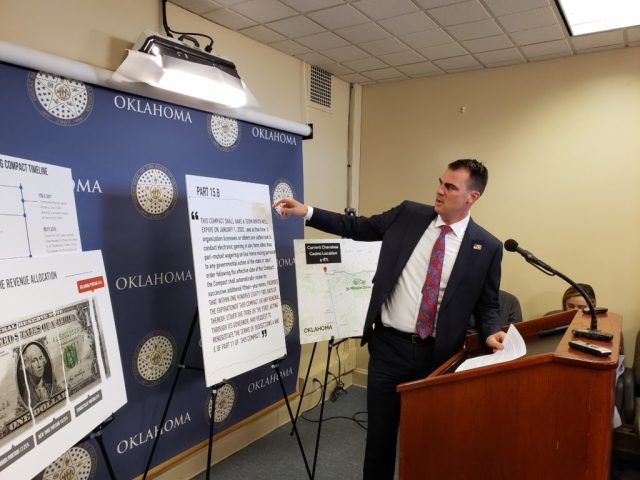

Gov. Kevin Stitt met with members of the media on Tuesday, Dec. 17, 2019, to say he wanted tribal nations in the state to sign an extension of the current gaming compact by the first of the year. BEN FELDER/The Frontier
Oklahoma’s governor has said tribal casinos will be operating in violation of the law on Jan. 1, while tribal officials have maintained it will be business as usual for casinos on New Year’s Day.
“The state cannot reach an agreement that addresses the needs of every single tribe in the state in the next 18 days,” Gov. Kevin Stitt said at a media conference on Tuesday.
The only way to avoid the state taking legal action against casinos, Stitt said, was for the tribes to sign an extension to the current compact.
Minutes after Stitt’s remarks, Matthew Morgan, chairman of the Oklahoma Indian Gaming Association, said tribes “do not need an extension.”
Stitt, who wants higher fees paid to the state from casinos, has publicly debated the tribes for months, arguing an expiring compact requires a new deal.
Tribes have maintained the compact automatically renews at the first of the year under the current agreement, which pays the state between 4 percent and 10 percent of casino-style gaming revenue.
While each side is preparing for a likely showdown in federal court, both sides have hinted that an expansion of gambling, including sports betting, could be part of any new agreement.
Casino gaming is “always expanding and growing and there may be some new opportunities that tribes want to take advantage of,” said Morgan, without referring to any specific type of expansion.
Some Oklahoma tribes are preparing for a future where casino patrons can gamble on sporting events, including the Choctaw Nation, which is in the process of hiring a senior director of sportsbook and interactive gaming, according to an online job posting for the position.
Sports betting outside of Nevada became an option following a 2018 U.S. Supreme Court ruling.
At least 17 states have legalized sports betting, including Arkansas.
Michigan lawmakers recently advanced legislation legalizing sports betting. While not as many as Oklahoma, Michigan has a large number of tribal casinos.
“Of all the states that have adopted, none have a tribal component to the extent that Michigan has,” Rep. Brandt Iden, the Republican lawmaker who championed the sports betting legalization bills, told the Detroit News. “With 23 tribal casinos, we are the largest state that has adopted this.”
Oklahoma is home to more than 130 tribal casinos.
Stitt has said he is open to discussing sports betting and tribes might find a receptive audience in the state Legislature, which has accepted hundreds of thousands of dollars in campaign contributions from tribes over the last two election cycles.
But Stitt and tribal leaders do not appear close to hashing out a deal for sports betting, let alone a continuation of the current compact.
On Tuesday, Stitt also announced he was taking the lead in negotiations, a position that had been given to Attorney General Mike Hunter. Hunter had hosted a meeting in October, but tribal officials said it was unproductive.
Stitt said he plans to hire an out of state law firm in the coming days. While he would not name the law firm, he said it had “dealt with these exact issues in New Mexico and other states.”
“We are in the process of hiring additional legal counsel in preparation if we have to fight this out in court,” Stitt said.
Further reading:

